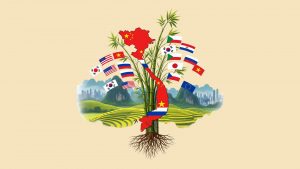A recent conflict between India and Pakistan occurred in May 2025, drawing attention to the volatility of the bilateral relations between the states. The political leadership in both countries stirred nationalist sentiments, frequently prioritising military responses over diplomatic engagement; the international community, especially the United States, has highlighted the global concern over the potential for escalation between two nuclear-armed neighbours; and despite the ceasefire, the situation remains fragile, with underlying issues unresolved, including the dilemma of retaliation and mutual suspicion reflecting a deeply entrenched. Notable leaders on both sides had frequently used nationalist emotions to justify fast, punitive acts, bolstering their political credibility with displays of might. In such a volatile situation, minor occurrences or media narratives have raised tensions and variables motivated by political optics rather than strategic necessity: demonstrating supremacy, and sustaining the enemy’s image as fatal, driven by the security dilemma. The cycle of conflict between these two nations demonstrates how both states are trained to react rather than reflect. The end consequence is a reflexive politics in which a performative display of might weakens diplomacy, and the possibility of de-escalation is continuously sacrificed on the altar of national pride.
While looking from a perspective of deterrence theory, which frequently dominates the debate about the India-Pakistan relationship, it only partially explains the complexities of their current war. However, to introduce the same with a better lens, constructivism could be more of an appealing political perspective, as it highlights the deeply embedded narratives and identities that shape the behaviours of both countries. Unlike deterrence, which is based on rational actors and calculable threats, constructivism, with regards to this conflict, emphasises the role of historical memory, national identity, and social context in moulding state behaviour. The India-Pakistan relationship is more than a geopolitical rivalry; it has been constructed over decades via opposing national thoughts, tragic histories, and constant ‘othering.’ These considerations were perceptible for both sides due to multiple patriotic narratives and emotionally charged media coverage that stoked public emotions, creating an environment in which political leaders felt compelled to take decisive, even violent, action in order to maintain domestic legitimacy. These identity-based forces had a significant impact on political decisions, which were not taken in isolation.
Applying the Schmittian dynamic
The escalation was more than just tactical revenge or deterrent; it was also about reaffirming national self-conceptions. Carl Schmitt’s friend–enemy distinction offers a more compelling lens through which to interpret the enduring hostility and recent military exchanges between India and Pakistan. According to Schmitt, politics is rooted in the binary of friend versus enemy, a distinction so fundamental that it can legitimise acts of war. This framework continues to resonate in the context where both nations routinely define their national identities and security priorities in opposition to each other. The recent retaliatory strikes and heightened rhetoric along the Line of Control (LOC) exemplify how this Schmittian dynamic is not only alive but strategically mobilised. While we discussed deterrence theory and constructivism as primitive escalating factors to consider when strategising political narratives on both sides, Schmittian philosophy is often used to portray the other as an existential threat, not just a geopolitical rival but a civilizational adversary, which is of paramount importance here. In such a scenario, military actions are not simply tactical responses but are framed as necessary acts of self-preservation. They are meant to reaffirm sovereignty and national cohesion in the face of a perceived enemy, thus rendering diplomacy secondary or even suspect. The ultimate test of the political system lies in the capacity to identify and confront the enemy. In doing so, states justify exceptional measures including pre-emptive strikes, curfews, and suspension of dialogue as existential imperatives. Schmitt’s theory thereby illuminates how the friend–enemy binary is not just rhetorical but operational, shaping policy and justifying violence. Ultimately, the India-Pakistan context reveals the enduring relevance and danger of Schmitt’s philosophy: when the enemy is existential, peace becomes provisional, and politics is defined less by compromise than by conflict.
Concluding the Zero-Sum Dynamic
In summary, traditional realist or deterrence-based theories by themselves are failing to adequately explain the India-Pakistan conflict. A constructivist viewpoint can demonstrate how strongly national identity, historical memory, and emotionally charged narratives influence public opinion and political decisions on both sides. When viewed from the lens of Schmitt’s friend-enemy distinction, the struggle appears not only as a contest over territory or power, but as a foundational collision of generated identities—within each nation, defining itself in part by what it is not. Schmitt’s lens then introduces a unique solution which lies not only in treaties or ceasefires, but in transforming the very narratives that sustain the perception of the “other” as an existential threat. This means reimagining the bilateral relations through shared cultural, economic, and humanitarian frameworks that replace enmity with interdependence. Only by undermining the ideological foundation of the friend–enemy binary—through education, people-to-people contact, media reform, and inclusive leadership—can a genuine and durable peace begin to take root for the long term. Hence, in this zero-sum dynamic, peace is not simply a diplomatic achievement but a challenge to deeply held narratives, not in the absence of conflict but in the reconstruction of political imagination.
Trisha Raha is a current student at the University of Stirling majoring MSc International Cooperation and Conflict (2023-2024). She is also an author, a published article writer, and a human rights volunteer with an emphasis on humanitarian studies, security politics, artificial intelligence, and gender.







